Business Law: UK Legal System, Business Impact and Disputes
VerifiedAdded on 2021/01/02
|14
|4655
|499
Report
AI Summary
This business law report provides a comprehensive overview of the UK legal system and its impact on businesses. It begins by identifying the different sources of UK law, including legislation, common law, European Union Law, and the European Convention on Human Rights, and examines the roles of the government in the law-making process. The report then analyzes how company, employment, and contract law affect businesses, exploring the differences between legislation, regulations, and standards. Furthermore, it delves into the legal formation, management, and funding of various types of business organizations, evaluating their advantages and disadvantages. Finally, the report identifies and recommends appropriate legal solutions for resolving disputes, comparing different sources of legal advice. The report aims to provide a detailed analysis of the UK legal system in relation to business operations, and provides practical examples and case studies to support its findings.
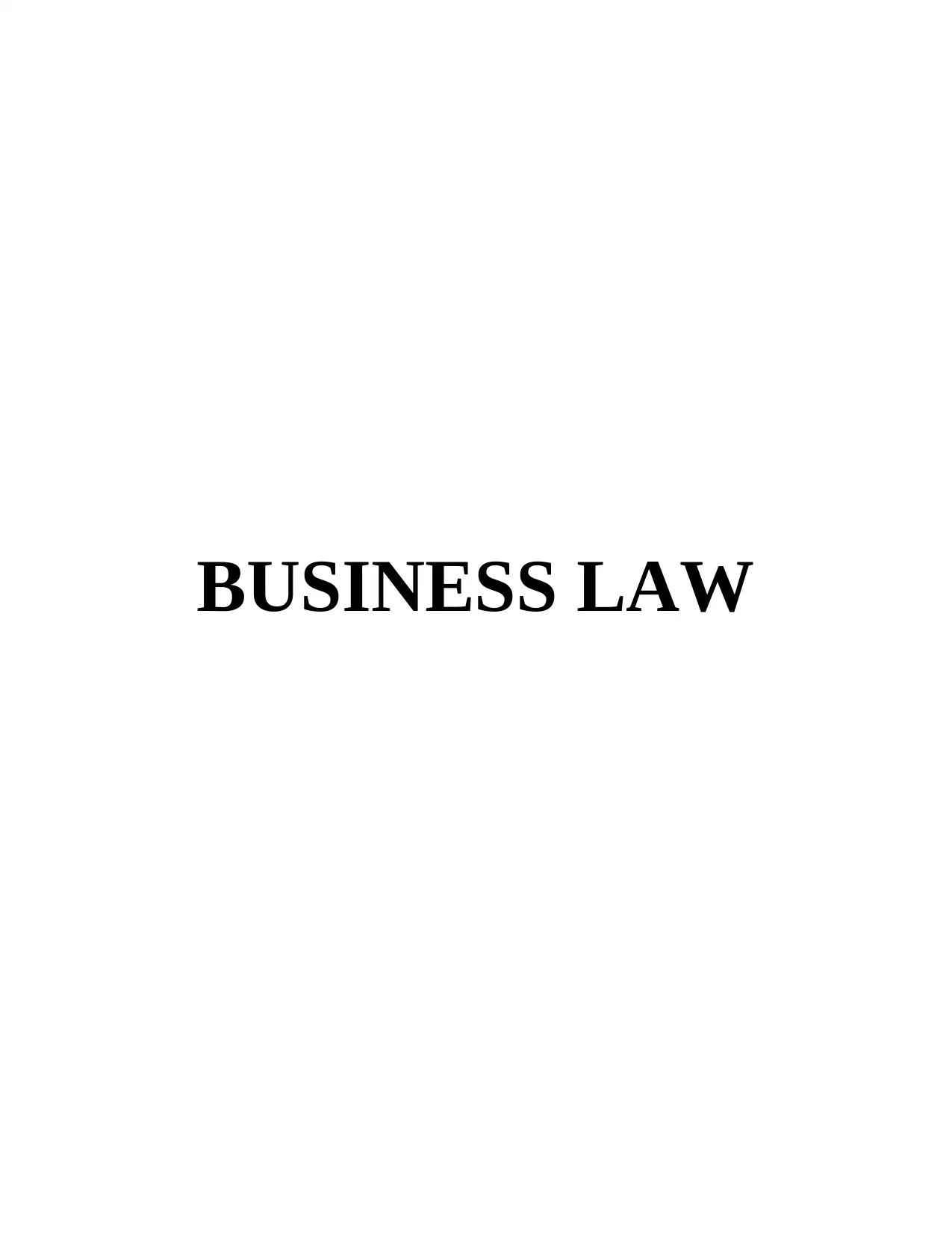
BUSINESS LAW
Paraphrase This Document
Need a fresh take? Get an instant paraphrase of this document with our AI Paraphraser
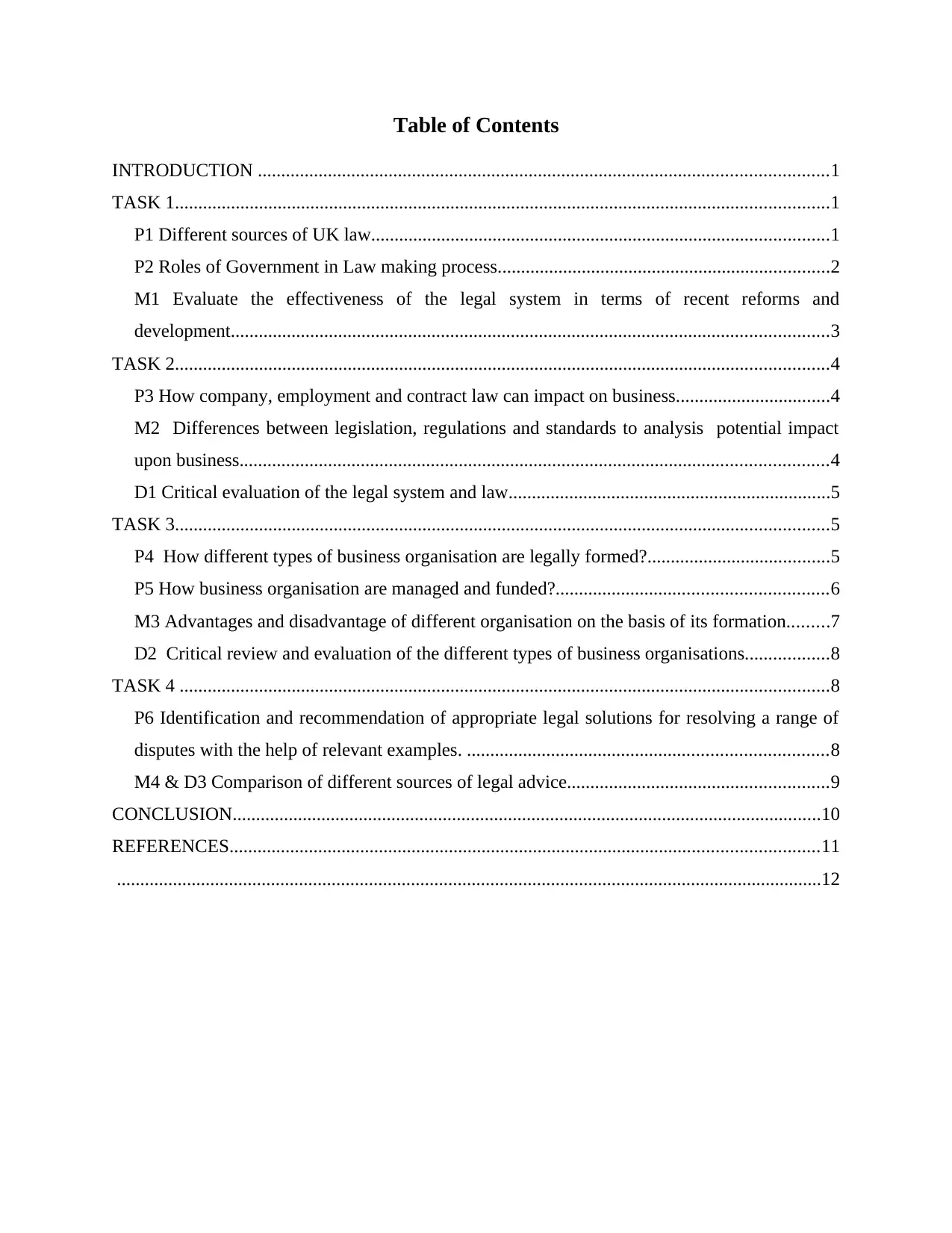
Table of Contents
INTRODUCTION ..........................................................................................................................1
TASK 1............................................................................................................................................1
P1 Different sources of UK law..................................................................................................1
P2 Roles of Government in Law making process.......................................................................2
M1 Evaluate the effectiveness of the legal system in terms of recent reforms and
development................................................................................................................................3
TASK 2............................................................................................................................................4
P3 How company, employment and contract law can impact on business.................................4
M2 Differences between legislation, regulations and standards to analysis potential impact
upon business..............................................................................................................................4
D1 Critical evaluation of the legal system and law.....................................................................5
TASK 3............................................................................................................................................5
P4 How different types of business organisation are legally formed?.......................................5
P5 How business organisation are managed and funded?..........................................................6
M3 Advantages and disadvantage of different organisation on the basis of its formation.........7
D2 Critical review and evaluation of the different types of business organisations..................8
TASK 4 ...........................................................................................................................................8
P6 Identification and recommendation of appropriate legal solutions for resolving a range of
disputes with the help of relevant examples. .............................................................................8
M4 & D3 Comparison of different sources of legal advice........................................................9
CONCLUSION..............................................................................................................................10
REFERENCES..............................................................................................................................11
.......................................................................................................................................................12
INTRODUCTION ..........................................................................................................................1
TASK 1............................................................................................................................................1
P1 Different sources of UK law..................................................................................................1
P2 Roles of Government in Law making process.......................................................................2
M1 Evaluate the effectiveness of the legal system in terms of recent reforms and
development................................................................................................................................3
TASK 2............................................................................................................................................4
P3 How company, employment and contract law can impact on business.................................4
M2 Differences between legislation, regulations and standards to analysis potential impact
upon business..............................................................................................................................4
D1 Critical evaluation of the legal system and law.....................................................................5
TASK 3............................................................................................................................................5
P4 How different types of business organisation are legally formed?.......................................5
P5 How business organisation are managed and funded?..........................................................6
M3 Advantages and disadvantage of different organisation on the basis of its formation.........7
D2 Critical review and evaluation of the different types of business organisations..................8
TASK 4 ...........................................................................................................................................8
P6 Identification and recommendation of appropriate legal solutions for resolving a range of
disputes with the help of relevant examples. .............................................................................8
M4 & D3 Comparison of different sources of legal advice........................................................9
CONCLUSION..............................................................................................................................10
REFERENCES..............................................................................................................................11
.......................................................................................................................................................12

⊘ This is a preview!⊘
Do you want full access?
Subscribe today to unlock all pages.

Trusted by 1+ million students worldwide
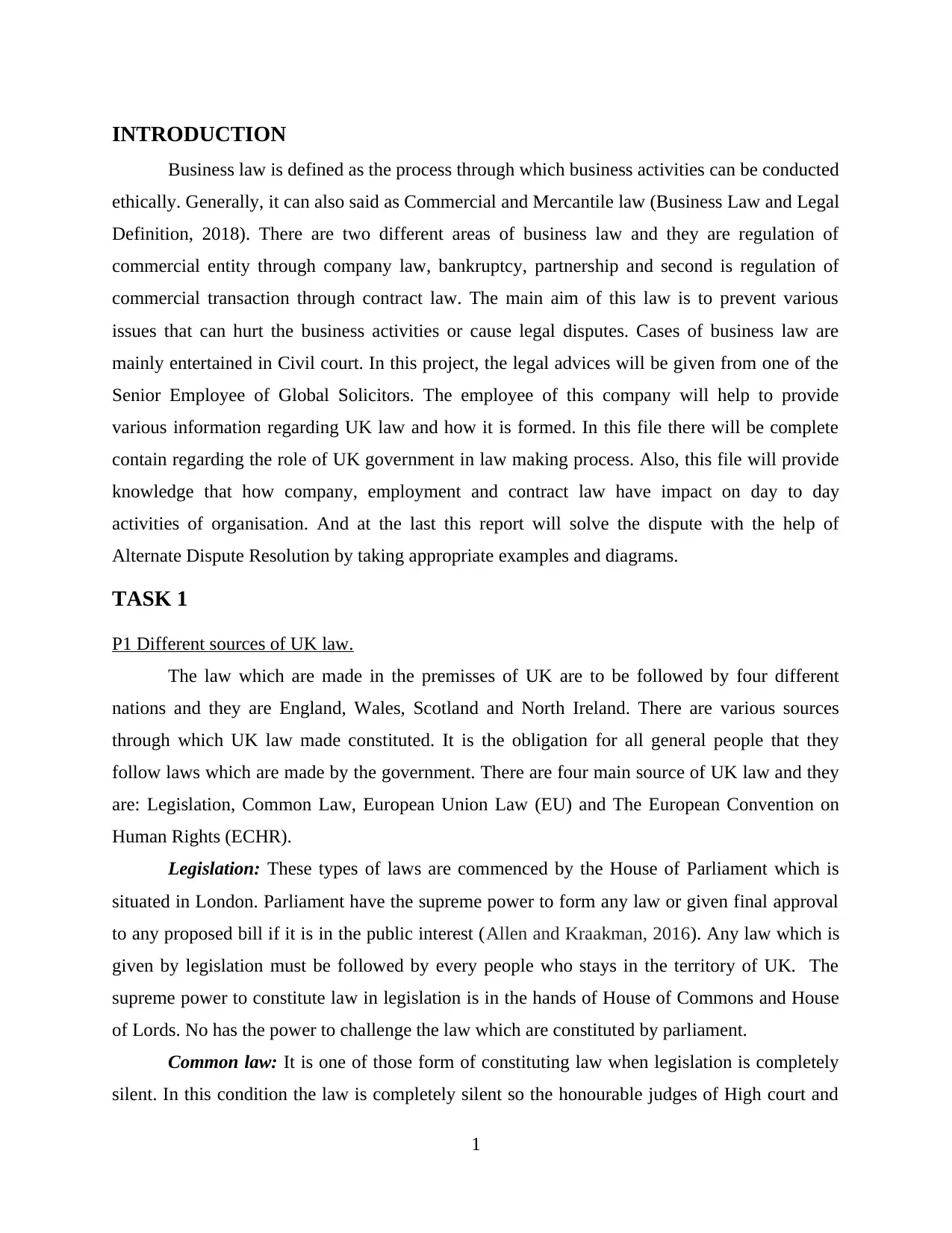
INTRODUCTION
Business law is defined as the process through which business activities can be conducted
ethically. Generally, it can also said as Commercial and Mercantile law (Business Law and Legal
Definition, 2018). There are two different areas of business law and they are regulation of
commercial entity through company law, bankruptcy, partnership and second is regulation of
commercial transaction through contract law. The main aim of this law is to prevent various
issues that can hurt the business activities or cause legal disputes. Cases of business law are
mainly entertained in Civil court. In this project, the legal advices will be given from one of the
Senior Employee of Global Solicitors. The employee of this company will help to provide
various information regarding UK law and how it is formed. In this file there will be complete
contain regarding the role of UK government in law making process. Also, this file will provide
knowledge that how company, employment and contract law have impact on day to day
activities of organisation. And at the last this report will solve the dispute with the help of
Alternate Dispute Resolution by taking appropriate examples and diagrams.
TASK 1
P1 Different sources of UK law.
The law which are made in the premisses of UK are to be followed by four different
nations and they are England, Wales, Scotland and North Ireland. There are various sources
through which UK law made constituted. It is the obligation for all general people that they
follow laws which are made by the government. There are four main source of UK law and they
are: Legislation, Common Law, European Union Law (EU) and The European Convention on
Human Rights (ECHR).
Legislation: These types of laws are commenced by the House of Parliament which is
situated in London. Parliament have the supreme power to form any law or given final approval
to any proposed bill if it is in the public interest (Allen and Kraakman, 2016). Any law which is
given by legislation must be followed by every people who stays in the territory of UK. The
supreme power to constitute law in legislation is in the hands of House of Commons and House
of Lords. No has the power to challenge the law which are constituted by parliament.
Common law: It is one of those form of constituting law when legislation is completely
silent. In this condition the law is completely silent so the honourable judges of High court and
1
Business law is defined as the process through which business activities can be conducted
ethically. Generally, it can also said as Commercial and Mercantile law (Business Law and Legal
Definition, 2018). There are two different areas of business law and they are regulation of
commercial entity through company law, bankruptcy, partnership and second is regulation of
commercial transaction through contract law. The main aim of this law is to prevent various
issues that can hurt the business activities or cause legal disputes. Cases of business law are
mainly entertained in Civil court. In this project, the legal advices will be given from one of the
Senior Employee of Global Solicitors. The employee of this company will help to provide
various information regarding UK law and how it is formed. In this file there will be complete
contain regarding the role of UK government in law making process. Also, this file will provide
knowledge that how company, employment and contract law have impact on day to day
activities of organisation. And at the last this report will solve the dispute with the help of
Alternate Dispute Resolution by taking appropriate examples and diagrams.
TASK 1
P1 Different sources of UK law.
The law which are made in the premisses of UK are to be followed by four different
nations and they are England, Wales, Scotland and North Ireland. There are various sources
through which UK law made constituted. It is the obligation for all general people that they
follow laws which are made by the government. There are four main source of UK law and they
are: Legislation, Common Law, European Union Law (EU) and The European Convention on
Human Rights (ECHR).
Legislation: These types of laws are commenced by the House of Parliament which is
situated in London. Parliament have the supreme power to form any law or given final approval
to any proposed bill if it is in the public interest (Allen and Kraakman, 2016). Any law which is
given by legislation must be followed by every people who stays in the territory of UK. The
supreme power to constitute law in legislation is in the hands of House of Commons and House
of Lords. No has the power to challenge the law which are constituted by parliament.
Common law: It is one of those form of constituting law when legislation is completely
silent. In this condition the law is completely silent so the honourable judges of High court and
1
Paraphrase This Document
Need a fresh take? Get an instant paraphrase of this document with our AI Paraphraser
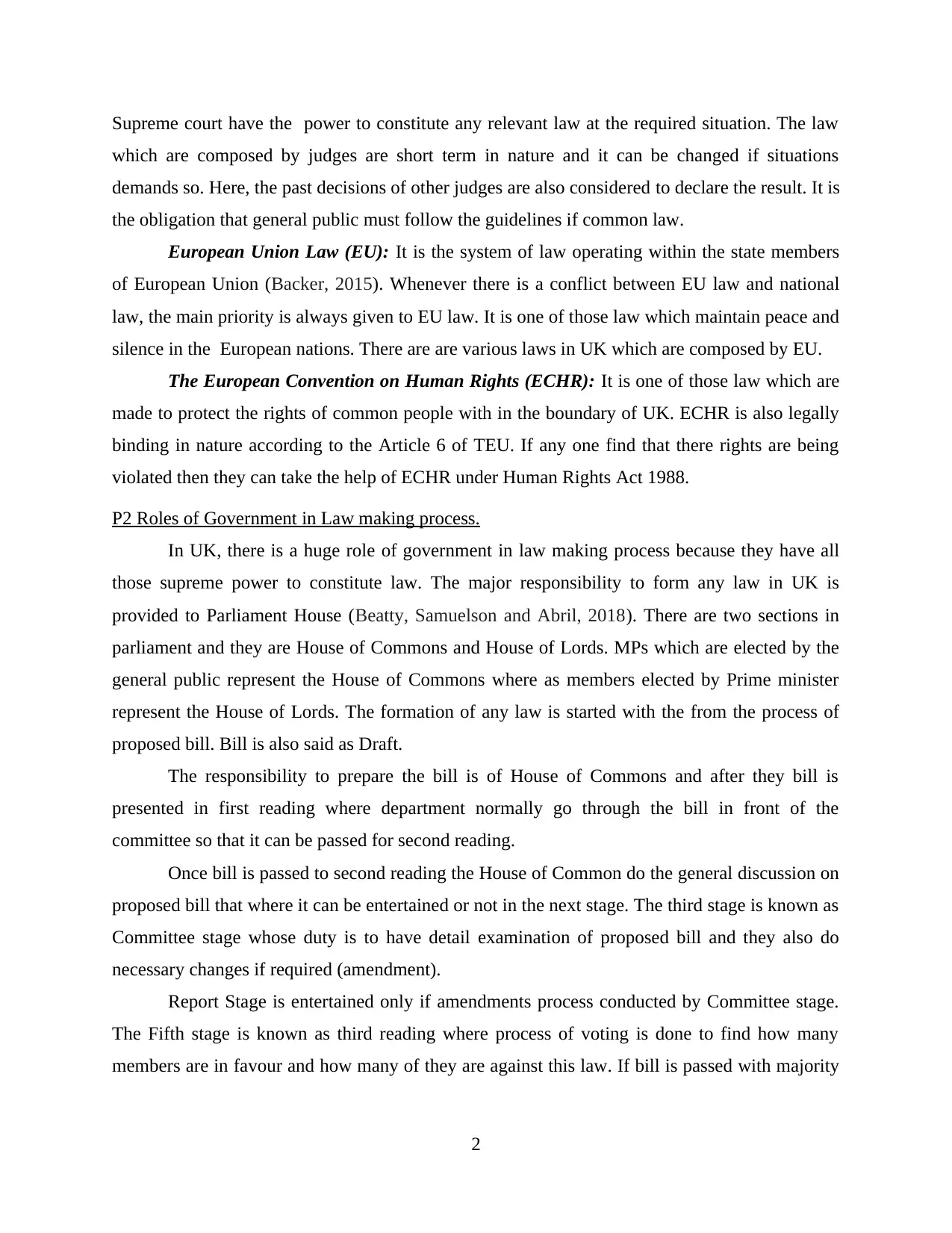
Supreme court have the power to constitute any relevant law at the required situation. The law
which are composed by judges are short term in nature and it can be changed if situations
demands so. Here, the past decisions of other judges are also considered to declare the result. It is
the obligation that general public must follow the guidelines if common law.
European Union Law (EU): It is the system of law operating within the state members
of European Union (Backer, 2015). Whenever there is a conflict between EU law and national
law, the main priority is always given to EU law. It is one of those law which maintain peace and
silence in the European nations. There are are various laws in UK which are composed by EU.
The European Convention on Human Rights (ECHR): It is one of those law which are
made to protect the rights of common people with in the boundary of UK. ECHR is also legally
binding in nature according to the Article 6 of TEU. If any one find that there rights are being
violated then they can take the help of ECHR under Human Rights Act 1988.
P2 Roles of Government in Law making process.
In UK, there is a huge role of government in law making process because they have all
those supreme power to constitute law. The major responsibility to form any law in UK is
provided to Parliament House (Beatty, Samuelson and Abril, 2018). There are two sections in
parliament and they are House of Commons and House of Lords. MPs which are elected by the
general public represent the House of Commons where as members elected by Prime minister
represent the House of Lords. The formation of any law is started with the from the process of
proposed bill. Bill is also said as Draft.
The responsibility to prepare the bill is of House of Commons and after they bill is
presented in first reading where department normally go through the bill in front of the
committee so that it can be passed for second reading.
Once bill is passed to second reading the House of Common do the general discussion on
proposed bill that where it can be entertained or not in the next stage. The third stage is known as
Committee stage whose duty is to have detail examination of proposed bill and they also do
necessary changes if required (amendment).
Report Stage is entertained only if amendments process conducted by Committee stage.
The Fifth stage is known as third reading where process of voting is done to find how many
members are in favour and how many of they are against this law. If bill is passed with majority
2
which are composed by judges are short term in nature and it can be changed if situations
demands so. Here, the past decisions of other judges are also considered to declare the result. It is
the obligation that general public must follow the guidelines if common law.
European Union Law (EU): It is the system of law operating within the state members
of European Union (Backer, 2015). Whenever there is a conflict between EU law and national
law, the main priority is always given to EU law. It is one of those law which maintain peace and
silence in the European nations. There are are various laws in UK which are composed by EU.
The European Convention on Human Rights (ECHR): It is one of those law which are
made to protect the rights of common people with in the boundary of UK. ECHR is also legally
binding in nature according to the Article 6 of TEU. If any one find that there rights are being
violated then they can take the help of ECHR under Human Rights Act 1988.
P2 Roles of Government in Law making process.
In UK, there is a huge role of government in law making process because they have all
those supreme power to constitute law. The major responsibility to form any law in UK is
provided to Parliament House (Beatty, Samuelson and Abril, 2018). There are two sections in
parliament and they are House of Commons and House of Lords. MPs which are elected by the
general public represent the House of Commons where as members elected by Prime minister
represent the House of Lords. The formation of any law is started with the from the process of
proposed bill. Bill is also said as Draft.
The responsibility to prepare the bill is of House of Commons and after they bill is
presented in first reading where department normally go through the bill in front of the
committee so that it can be passed for second reading.
Once bill is passed to second reading the House of Common do the general discussion on
proposed bill that where it can be entertained or not in the next stage. The third stage is known as
Committee stage whose duty is to have detail examination of proposed bill and they also do
necessary changes if required (amendment).
Report Stage is entertained only if amendments process conducted by Committee stage.
The Fifth stage is known as third reading where process of voting is done to find how many
members are in favour and how many of they are against this law. If bill is passed with majority
2
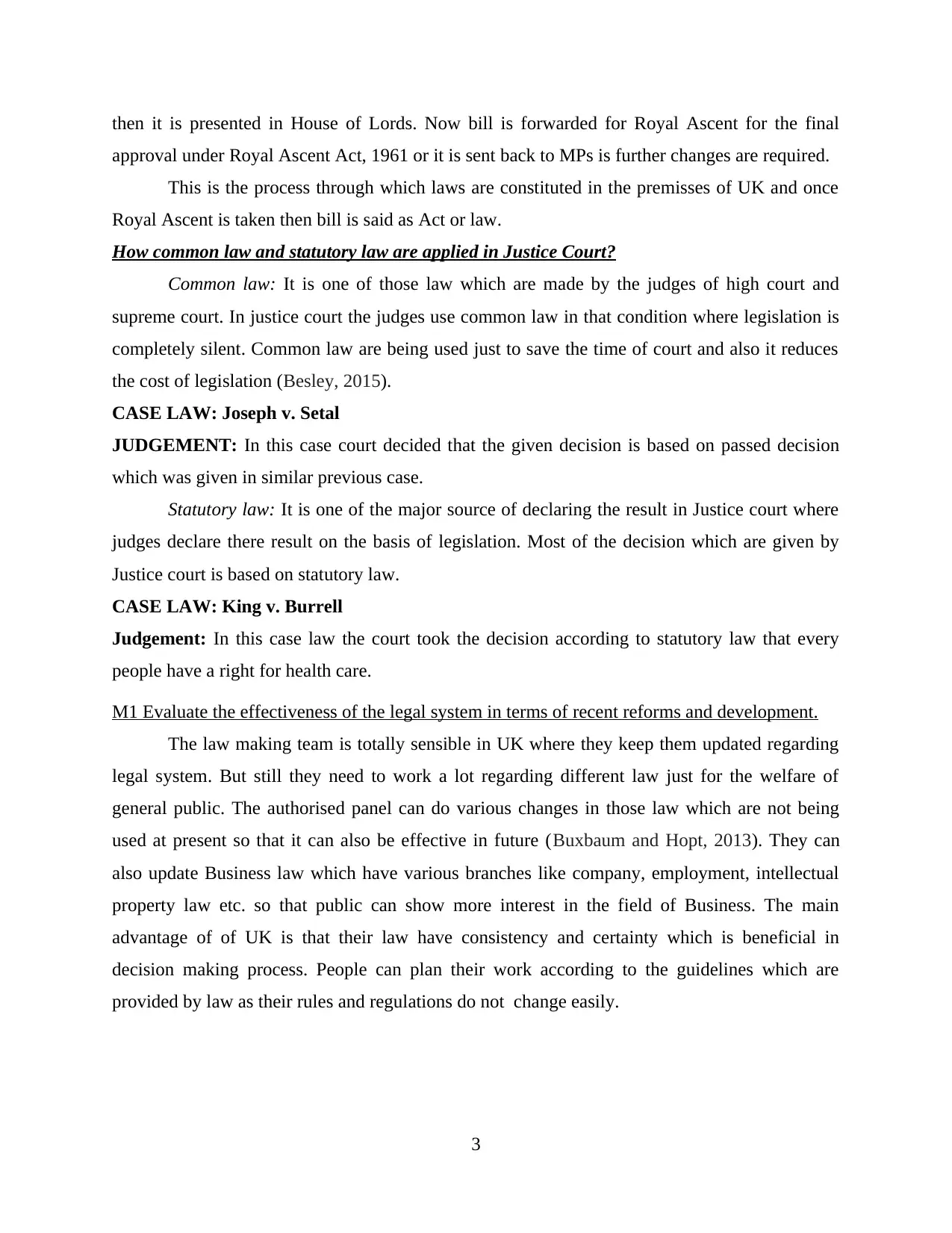
then it is presented in House of Lords. Now bill is forwarded for Royal Ascent for the final
approval under Royal Ascent Act, 1961 or it is sent back to MPs is further changes are required.
This is the process through which laws are constituted in the premisses of UK and once
Royal Ascent is taken then bill is said as Act or law.
How common law and statutory law are applied in Justice Court?
Common law: It is one of those law which are made by the judges of high court and
supreme court. In justice court the judges use common law in that condition where legislation is
completely silent. Common law are being used just to save the time of court and also it reduces
the cost of legislation (Besley, 2015).
CASE LAW: Joseph v. Setal
JUDGEMENT: In this case court decided that the given decision is based on passed decision
which was given in similar previous case.
Statutory law: It is one of the major source of declaring the result in Justice court where
judges declare there result on the basis of legislation. Most of the decision which are given by
Justice court is based on statutory law.
CASE LAW: King v. Burrell
Judgement: In this case law the court took the decision according to statutory law that every
people have a right for health care.
M1 Evaluate the effectiveness of the legal system in terms of recent reforms and development.
The law making team is totally sensible in UK where they keep them updated regarding
legal system. But still they need to work a lot regarding different law just for the welfare of
general public. The authorised panel can do various changes in those law which are not being
used at present so that it can also be effective in future (Buxbaum and Hopt, 2013). They can
also update Business law which have various branches like company, employment, intellectual
property law etc. so that public can show more interest in the field of Business. The main
advantage of of UK is that their law have consistency and certainty which is beneficial in
decision making process. People can plan their work according to the guidelines which are
provided by law as their rules and regulations do not change easily.
3
approval under Royal Ascent Act, 1961 or it is sent back to MPs is further changes are required.
This is the process through which laws are constituted in the premisses of UK and once
Royal Ascent is taken then bill is said as Act or law.
How common law and statutory law are applied in Justice Court?
Common law: It is one of those law which are made by the judges of high court and
supreme court. In justice court the judges use common law in that condition where legislation is
completely silent. Common law are being used just to save the time of court and also it reduces
the cost of legislation (Besley, 2015).
CASE LAW: Joseph v. Setal
JUDGEMENT: In this case court decided that the given decision is based on passed decision
which was given in similar previous case.
Statutory law: It is one of the major source of declaring the result in Justice court where
judges declare there result on the basis of legislation. Most of the decision which are given by
Justice court is based on statutory law.
CASE LAW: King v. Burrell
Judgement: In this case law the court took the decision according to statutory law that every
people have a right for health care.
M1 Evaluate the effectiveness of the legal system in terms of recent reforms and development.
The law making team is totally sensible in UK where they keep them updated regarding
legal system. But still they need to work a lot regarding different law just for the welfare of
general public. The authorised panel can do various changes in those law which are not being
used at present so that it can also be effective in future (Buxbaum and Hopt, 2013). They can
also update Business law which have various branches like company, employment, intellectual
property law etc. so that public can show more interest in the field of Business. The main
advantage of of UK is that their law have consistency and certainty which is beneficial in
decision making process. People can plan their work according to the guidelines which are
provided by law as their rules and regulations do not change easily.
3
⊘ This is a preview!⊘
Do you want full access?
Subscribe today to unlock all pages.

Trusted by 1+ million students worldwide
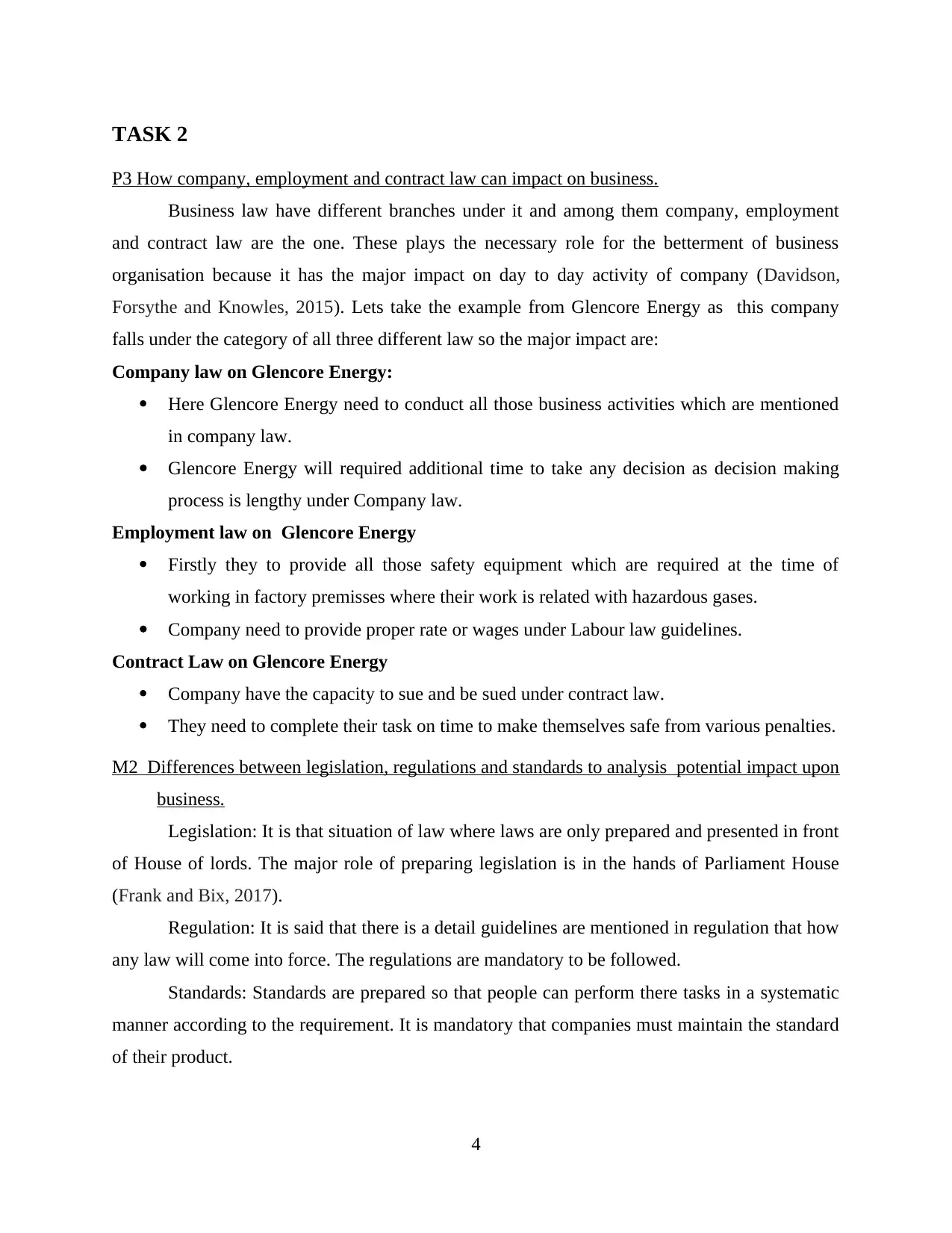
TASK 2
P3 How company, employment and contract law can impact on business.
Business law have different branches under it and among them company, employment
and contract law are the one. These plays the necessary role for the betterment of business
organisation because it has the major impact on day to day activity of company (Davidson,
Forsythe and Knowles, 2015). Lets take the example from Glencore Energy as this company
falls under the category of all three different law so the major impact are:
Company law on Glencore Energy:
Here Glencore Energy need to conduct all those business activities which are mentioned
in company law.
Glencore Energy will required additional time to take any decision as decision making
process is lengthy under Company law.
Employment law on Glencore Energy
Firstly they to provide all those safety equipment which are required at the time of
working in factory premisses where their work is related with hazardous gases.
Company need to provide proper rate or wages under Labour law guidelines.
Contract Law on Glencore Energy
Company have the capacity to sue and be sued under contract law.
They need to complete their task on time to make themselves safe from various penalties.
M2 Differences between legislation, regulations and standards to analysis potential impact upon
business.
Legislation: It is that situation of law where laws are only prepared and presented in front
of House of lords. The major role of preparing legislation is in the hands of Parliament House
(Frank and Bix, 2017).
Regulation: It is said that there is a detail guidelines are mentioned in regulation that how
any law will come into force. The regulations are mandatory to be followed.
Standards: Standards are prepared so that people can perform there tasks in a systematic
manner according to the requirement. It is mandatory that companies must maintain the standard
of their product.
4
P3 How company, employment and contract law can impact on business.
Business law have different branches under it and among them company, employment
and contract law are the one. These plays the necessary role for the betterment of business
organisation because it has the major impact on day to day activity of company (Davidson,
Forsythe and Knowles, 2015). Lets take the example from Glencore Energy as this company
falls under the category of all three different law so the major impact are:
Company law on Glencore Energy:
Here Glencore Energy need to conduct all those business activities which are mentioned
in company law.
Glencore Energy will required additional time to take any decision as decision making
process is lengthy under Company law.
Employment law on Glencore Energy
Firstly they to provide all those safety equipment which are required at the time of
working in factory premisses where their work is related with hazardous gases.
Company need to provide proper rate or wages under Labour law guidelines.
Contract Law on Glencore Energy
Company have the capacity to sue and be sued under contract law.
They need to complete their task on time to make themselves safe from various penalties.
M2 Differences between legislation, regulations and standards to analysis potential impact upon
business.
Legislation: It is that situation of law where laws are only prepared and presented in front
of House of lords. The major role of preparing legislation is in the hands of Parliament House
(Frank and Bix, 2017).
Regulation: It is said that there is a detail guidelines are mentioned in regulation that how
any law will come into force. The regulations are mandatory to be followed.
Standards: Standards are prepared so that people can perform there tasks in a systematic
manner according to the requirement. It is mandatory that companies must maintain the standard
of their product.
4
Paraphrase This Document
Need a fresh take? Get an instant paraphrase of this document with our AI Paraphraser
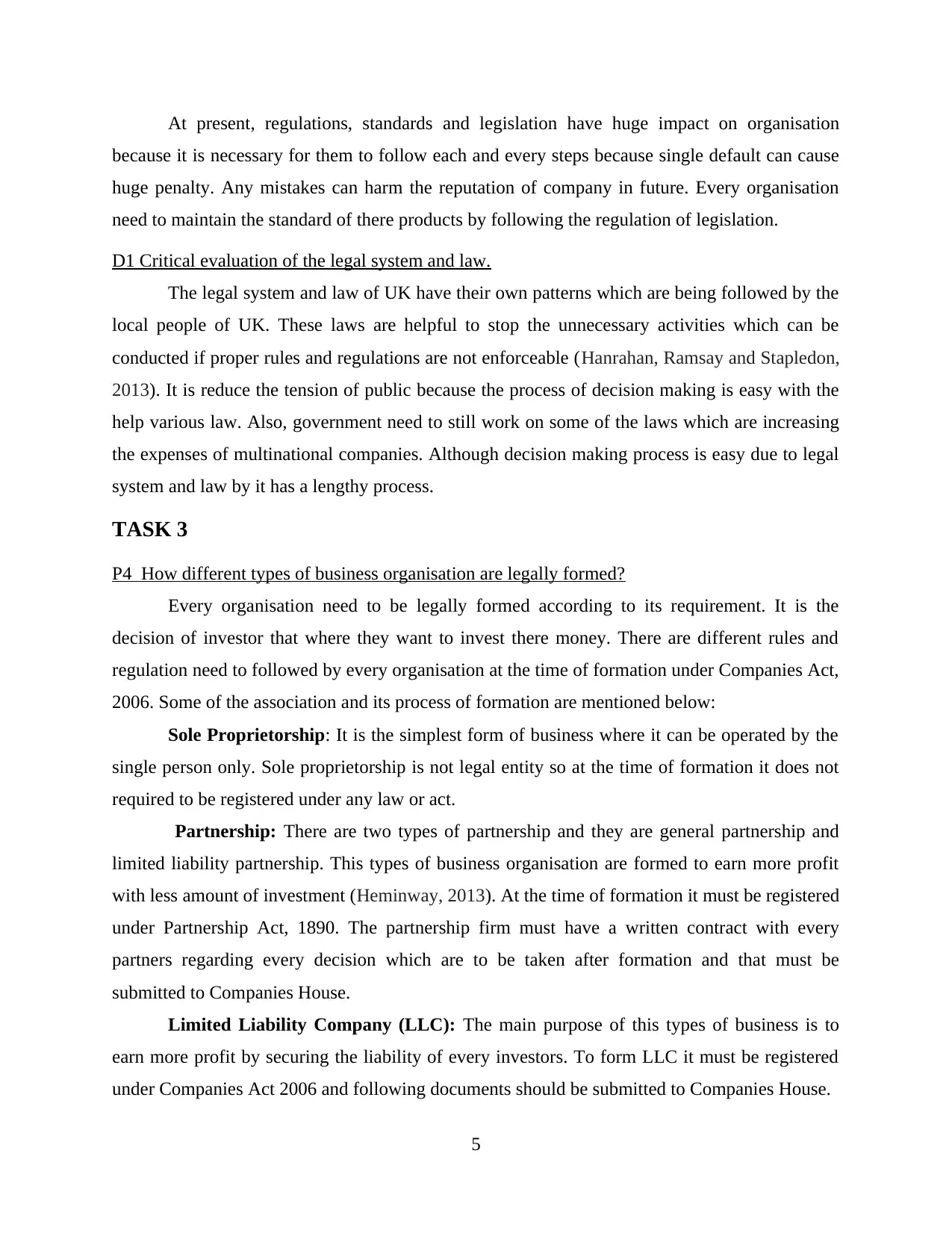
At present, regulations, standards and legislation have huge impact on organisation
because it is necessary for them to follow each and every steps because single default can cause
huge penalty. Any mistakes can harm the reputation of company in future. Every organisation
need to maintain the standard of there products by following the regulation of legislation.
D1 Critical evaluation of the legal system and law.
The legal system and law of UK have their own patterns which are being followed by the
local people of UK. These laws are helpful to stop the unnecessary activities which can be
conducted if proper rules and regulations are not enforceable (Hanrahan, Ramsay and Stapledon,
2013). It is reduce the tension of public because the process of decision making is easy with the
help various law. Also, government need to still work on some of the laws which are increasing
the expenses of multinational companies. Although decision making process is easy due to legal
system and law by it has a lengthy process.
TASK 3
P4 How different types of business organisation are legally formed?
Every organisation need to be legally formed according to its requirement. It is the
decision of investor that where they want to invest there money. There are different rules and
regulation need to followed by every organisation at the time of formation under Companies Act,
2006. Some of the association and its process of formation are mentioned below:
Sole Proprietorship: It is the simplest form of business where it can be operated by the
single person only. Sole proprietorship is not legal entity so at the time of formation it does not
required to be registered under any law or act.
Partnership: There are two types of partnership and they are general partnership and
limited liability partnership. This types of business organisation are formed to earn more profit
with less amount of investment (Heminway, 2013). At the time of formation it must be registered
under Partnership Act, 1890. The partnership firm must have a written contract with every
partners regarding every decision which are to be taken after formation and that must be
submitted to Companies House.
Limited Liability Company (LLC): The main purpose of this types of business is to
earn more profit by securing the liability of every investors. To form LLC it must be registered
under Companies Act 2006 and following documents should be submitted to Companies House.
5
because it is necessary for them to follow each and every steps because single default can cause
huge penalty. Any mistakes can harm the reputation of company in future. Every organisation
need to maintain the standard of there products by following the regulation of legislation.
D1 Critical evaluation of the legal system and law.
The legal system and law of UK have their own patterns which are being followed by the
local people of UK. These laws are helpful to stop the unnecessary activities which can be
conducted if proper rules and regulations are not enforceable (Hanrahan, Ramsay and Stapledon,
2013). It is reduce the tension of public because the process of decision making is easy with the
help various law. Also, government need to still work on some of the laws which are increasing
the expenses of multinational companies. Although decision making process is easy due to legal
system and law by it has a lengthy process.
TASK 3
P4 How different types of business organisation are legally formed?
Every organisation need to be legally formed according to its requirement. It is the
decision of investor that where they want to invest there money. There are different rules and
regulation need to followed by every organisation at the time of formation under Companies Act,
2006. Some of the association and its process of formation are mentioned below:
Sole Proprietorship: It is the simplest form of business where it can be operated by the
single person only. Sole proprietorship is not legal entity so at the time of formation it does not
required to be registered under any law or act.
Partnership: There are two types of partnership and they are general partnership and
limited liability partnership. This types of business organisation are formed to earn more profit
with less amount of investment (Heminway, 2013). At the time of formation it must be registered
under Partnership Act, 1890. The partnership firm must have a written contract with every
partners regarding every decision which are to be taken after formation and that must be
submitted to Companies House.
Limited Liability Company (LLC): The main purpose of this types of business is to
earn more profit by securing the liability of every investors. To form LLC it must be registered
under Companies Act 2006 and following documents should be submitted to Companies House.
5
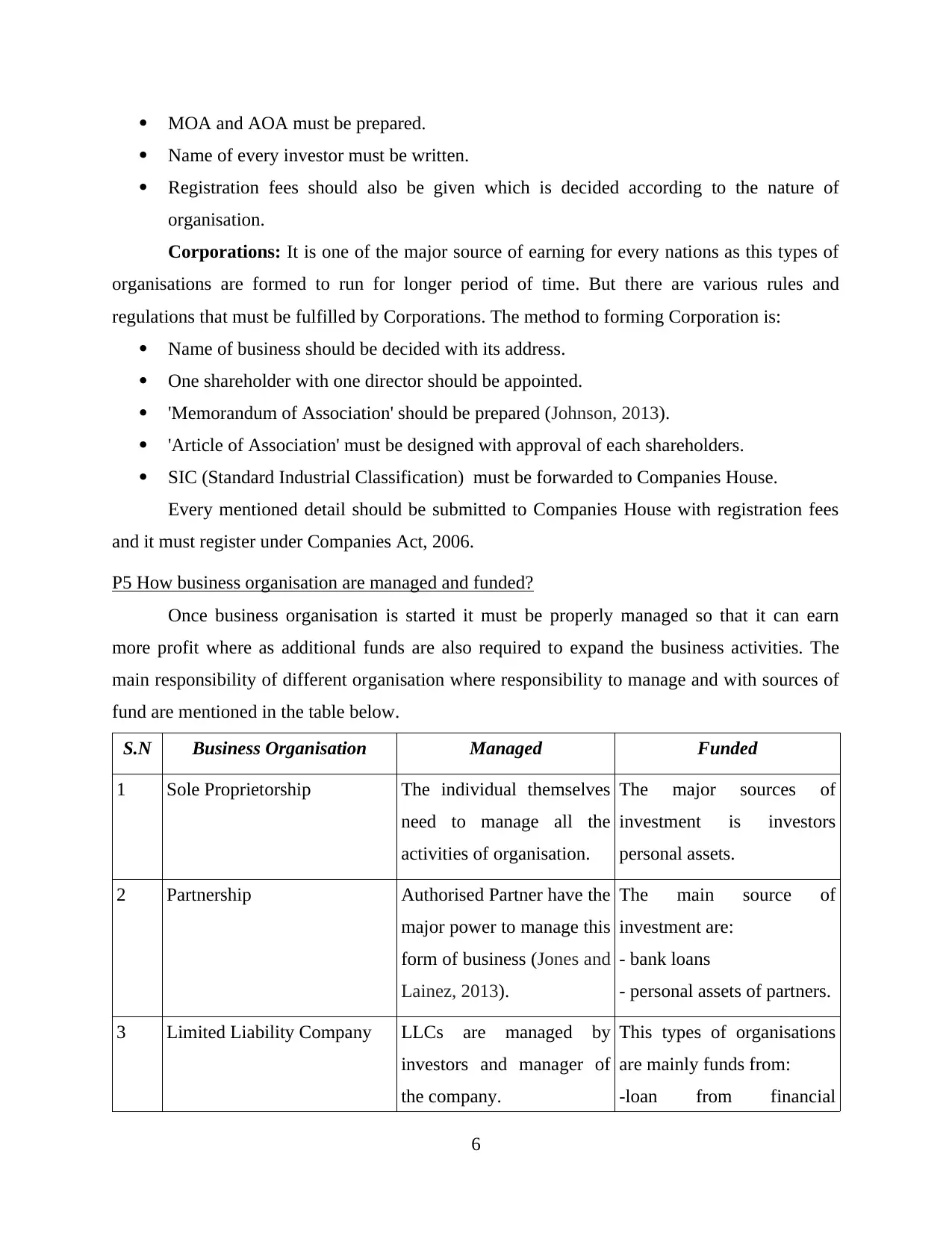
MOA and AOA must be prepared.
Name of every investor must be written.
Registration fees should also be given which is decided according to the nature of
organisation.
Corporations: It is one of the major source of earning for every nations as this types of
organisations are formed to run for longer period of time. But there are various rules and
regulations that must be fulfilled by Corporations. The method to forming Corporation is:
Name of business should be decided with its address.
One shareholder with one director should be appointed.
'Memorandum of Association' should be prepared (Johnson, 2013).
'Article of Association' must be designed with approval of each shareholders.
SIC (Standard Industrial Classification) must be forwarded to Companies House.
Every mentioned detail should be submitted to Companies House with registration fees
and it must register under Companies Act, 2006.
P5 How business organisation are managed and funded?
Once business organisation is started it must be properly managed so that it can earn
more profit where as additional funds are also required to expand the business activities. The
main responsibility of different organisation where responsibility to manage and with sources of
fund are mentioned in the table below.
S.N Business Organisation Managed Funded
1 Sole Proprietorship The individual themselves
need to manage all the
activities of organisation.
The major sources of
investment is investors
personal assets.
2 Partnership Authorised Partner have the
major power to manage this
form of business (Jones and
Lainez, 2013).
The main source of
investment are:
- bank loans
- personal assets of partners.
3 Limited Liability Company LLCs are managed by
investors and manager of
the company.
This types of organisations
are mainly funds from:
-loan from financial
6
Name of every investor must be written.
Registration fees should also be given which is decided according to the nature of
organisation.
Corporations: It is one of the major source of earning for every nations as this types of
organisations are formed to run for longer period of time. But there are various rules and
regulations that must be fulfilled by Corporations. The method to forming Corporation is:
Name of business should be decided with its address.
One shareholder with one director should be appointed.
'Memorandum of Association' should be prepared (Johnson, 2013).
'Article of Association' must be designed with approval of each shareholders.
SIC (Standard Industrial Classification) must be forwarded to Companies House.
Every mentioned detail should be submitted to Companies House with registration fees
and it must register under Companies Act, 2006.
P5 How business organisation are managed and funded?
Once business organisation is started it must be properly managed so that it can earn
more profit where as additional funds are also required to expand the business activities. The
main responsibility of different organisation where responsibility to manage and with sources of
fund are mentioned in the table below.
S.N Business Organisation Managed Funded
1 Sole Proprietorship The individual themselves
need to manage all the
activities of organisation.
The major sources of
investment is investors
personal assets.
2 Partnership Authorised Partner have the
major power to manage this
form of business (Jones and
Lainez, 2013).
The main source of
investment are:
- bank loans
- personal assets of partners.
3 Limited Liability Company LLCs are managed by
investors and manager of
the company.
This types of organisations
are mainly funds from:
-loan from financial
6
⊘ This is a preview!⊘
Do you want full access?
Subscribe today to unlock all pages.

Trusted by 1+ million students worldwide
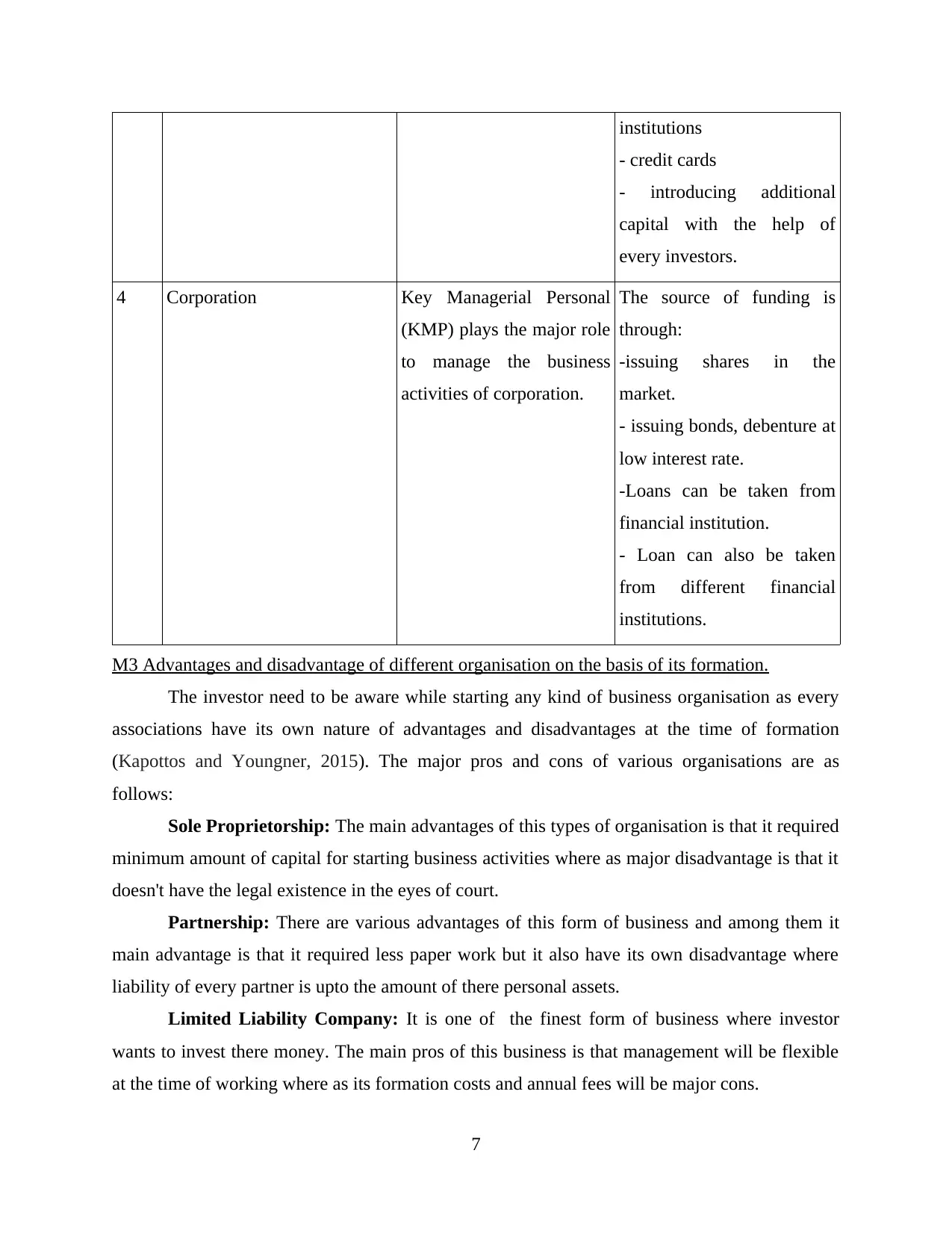
institutions
- credit cards
- introducing additional
capital with the help of
every investors.
4 Corporation Key Managerial Personal
(KMP) plays the major role
to manage the business
activities of corporation.
The source of funding is
through:
-issuing shares in the
market.
- issuing bonds, debenture at
low interest rate.
-Loans can be taken from
financial institution.
- Loan can also be taken
from different financial
institutions.
M3 Advantages and disadvantage of different organisation on the basis of its formation.
The investor need to be aware while starting any kind of business organisation as every
associations have its own nature of advantages and disadvantages at the time of formation
(Kapottos and Youngner, 2015). The major pros and cons of various organisations are as
follows:
Sole Proprietorship: The main advantages of this types of organisation is that it required
minimum amount of capital for starting business activities where as major disadvantage is that it
doesn't have the legal existence in the eyes of court.
Partnership: There are various advantages of this form of business and among them it
main advantage is that it required less paper work but it also have its own disadvantage where
liability of every partner is upto the amount of there personal assets.
Limited Liability Company: It is one of the finest form of business where investor
wants to invest there money. The main pros of this business is that management will be flexible
at the time of working where as its formation costs and annual fees will be major cons.
7
- credit cards
- introducing additional
capital with the help of
every investors.
4 Corporation Key Managerial Personal
(KMP) plays the major role
to manage the business
activities of corporation.
The source of funding is
through:
-issuing shares in the
market.
- issuing bonds, debenture at
low interest rate.
-Loans can be taken from
financial institution.
- Loan can also be taken
from different financial
institutions.
M3 Advantages and disadvantage of different organisation on the basis of its formation.
The investor need to be aware while starting any kind of business organisation as every
associations have its own nature of advantages and disadvantages at the time of formation
(Kapottos and Youngner, 2015). The major pros and cons of various organisations are as
follows:
Sole Proprietorship: The main advantages of this types of organisation is that it required
minimum amount of capital for starting business activities where as major disadvantage is that it
doesn't have the legal existence in the eyes of court.
Partnership: There are various advantages of this form of business and among them it
main advantage is that it required less paper work but it also have its own disadvantage where
liability of every partner is upto the amount of there personal assets.
Limited Liability Company: It is one of the finest form of business where investor
wants to invest there money. The main pros of this business is that management will be flexible
at the time of working where as its formation costs and annual fees will be major cons.
7
Paraphrase This Document
Need a fresh take? Get an instant paraphrase of this document with our AI Paraphraser
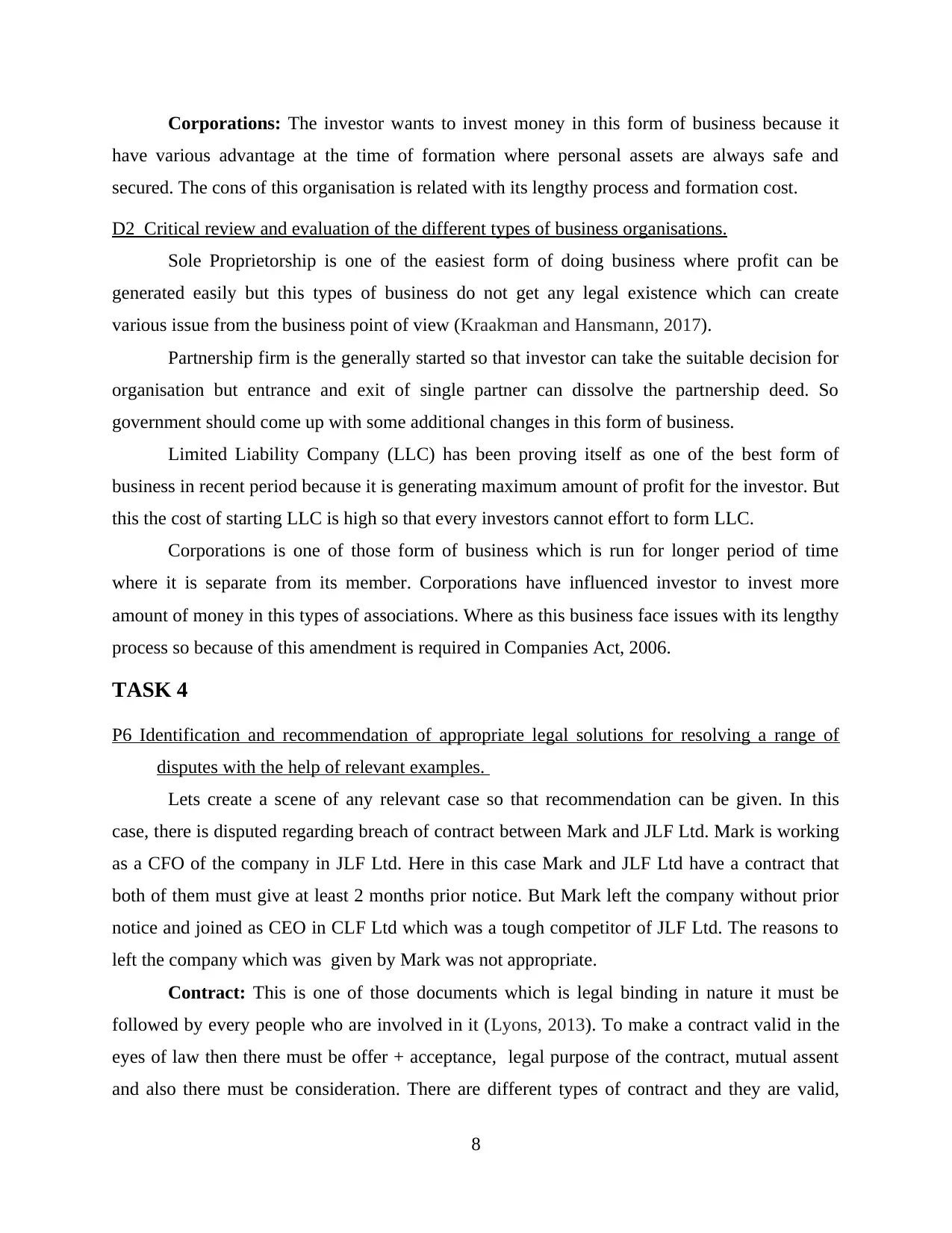
Corporations: The investor wants to invest money in this form of business because it
have various advantage at the time of formation where personal assets are always safe and
secured. The cons of this organisation is related with its lengthy process and formation cost.
D2 Critical review and evaluation of the different types of business organisations.
Sole Proprietorship is one of the easiest form of doing business where profit can be
generated easily but this types of business do not get any legal existence which can create
various issue from the business point of view (Kraakman and Hansmann, 2017).
Partnership firm is the generally started so that investor can take the suitable decision for
organisation but entrance and exit of single partner can dissolve the partnership deed. So
government should come up with some additional changes in this form of business.
Limited Liability Company (LLC) has been proving itself as one of the best form of
business in recent period because it is generating maximum amount of profit for the investor. But
this the cost of starting LLC is high so that every investors cannot effort to form LLC.
Corporations is one of those form of business which is run for longer period of time
where it is separate from its member. Corporations have influenced investor to invest more
amount of money in this types of associations. Where as this business face issues with its lengthy
process so because of this amendment is required in Companies Act, 2006.
TASK 4
P6 Identification and recommendation of appropriate legal solutions for resolving a range of
disputes with the help of relevant examples.
Lets create a scene of any relevant case so that recommendation can be given. In this
case, there is disputed regarding breach of contract between Mark and JLF Ltd. Mark is working
as a CFO of the company in JLF Ltd. Here in this case Mark and JLF Ltd have a contract that
both of them must give at least 2 months prior notice. But Mark left the company without prior
notice and joined as CEO in CLF Ltd which was a tough competitor of JLF Ltd. The reasons to
left the company which was given by Mark was not appropriate.
Contract: This is one of those documents which is legal binding in nature it must be
followed by every people who are involved in it (Lyons, 2013). To make a contract valid in the
eyes of law then there must be offer + acceptance, legal purpose of the contract, mutual assent
and also there must be consideration. There are different types of contract and they are valid,
8
have various advantage at the time of formation where personal assets are always safe and
secured. The cons of this organisation is related with its lengthy process and formation cost.
D2 Critical review and evaluation of the different types of business organisations.
Sole Proprietorship is one of the easiest form of doing business where profit can be
generated easily but this types of business do not get any legal existence which can create
various issue from the business point of view (Kraakman and Hansmann, 2017).
Partnership firm is the generally started so that investor can take the suitable decision for
organisation but entrance and exit of single partner can dissolve the partnership deed. So
government should come up with some additional changes in this form of business.
Limited Liability Company (LLC) has been proving itself as one of the best form of
business in recent period because it is generating maximum amount of profit for the investor. But
this the cost of starting LLC is high so that every investors cannot effort to form LLC.
Corporations is one of those form of business which is run for longer period of time
where it is separate from its member. Corporations have influenced investor to invest more
amount of money in this types of associations. Where as this business face issues with its lengthy
process so because of this amendment is required in Companies Act, 2006.
TASK 4
P6 Identification and recommendation of appropriate legal solutions for resolving a range of
disputes with the help of relevant examples.
Lets create a scene of any relevant case so that recommendation can be given. In this
case, there is disputed regarding breach of contract between Mark and JLF Ltd. Mark is working
as a CFO of the company in JLF Ltd. Here in this case Mark and JLF Ltd have a contract that
both of them must give at least 2 months prior notice. But Mark left the company without prior
notice and joined as CEO in CLF Ltd which was a tough competitor of JLF Ltd. The reasons to
left the company which was given by Mark was not appropriate.
Contract: This is one of those documents which is legal binding in nature it must be
followed by every people who are involved in it (Lyons, 2013). To make a contract valid in the
eyes of law then there must be offer + acceptance, legal purpose of the contract, mutual assent
and also there must be consideration. There are different types of contract and they are valid,
8
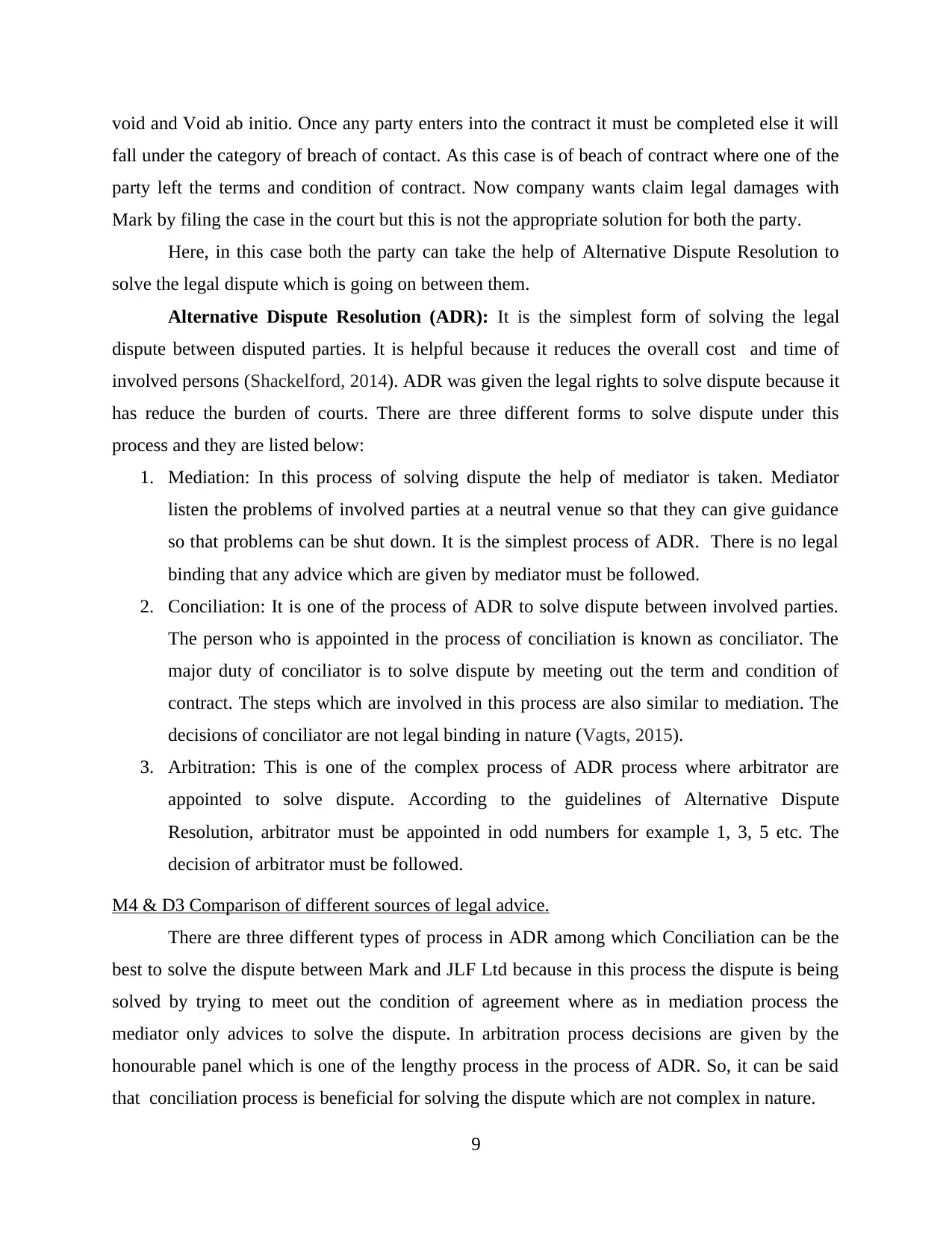
void and Void ab initio. Once any party enters into the contract it must be completed else it will
fall under the category of breach of contact. As this case is of beach of contract where one of the
party left the terms and condition of contract. Now company wants claim legal damages with
Mark by filing the case in the court but this is not the appropriate solution for both the party.
Here, in this case both the party can take the help of Alternative Dispute Resolution to
solve the legal dispute which is going on between them.
Alternative Dispute Resolution (ADR): It is the simplest form of solving the legal
dispute between disputed parties. It is helpful because it reduces the overall cost and time of
involved persons (Shackelford, 2014). ADR was given the legal rights to solve dispute because it
has reduce the burden of courts. There are three different forms to solve dispute under this
process and they are listed below:
1. Mediation: In this process of solving dispute the help of mediator is taken. Mediator
listen the problems of involved parties at a neutral venue so that they can give guidance
so that problems can be shut down. It is the simplest process of ADR. There is no legal
binding that any advice which are given by mediator must be followed.
2. Conciliation: It is one of the process of ADR to solve dispute between involved parties.
The person who is appointed in the process of conciliation is known as conciliator. The
major duty of conciliator is to solve dispute by meeting out the term and condition of
contract. The steps which are involved in this process are also similar to mediation. The
decisions of conciliator are not legal binding in nature (Vagts, 2015).
3. Arbitration: This is one of the complex process of ADR process where arbitrator are
appointed to solve dispute. According to the guidelines of Alternative Dispute
Resolution, arbitrator must be appointed in odd numbers for example 1, 3, 5 etc. The
decision of arbitrator must be followed.
M4 & D3 Comparison of different sources of legal advice.
There are three different types of process in ADR among which Conciliation can be the
best to solve the dispute between Mark and JLF Ltd because in this process the dispute is being
solved by trying to meet out the condition of agreement where as in mediation process the
mediator only advices to solve the dispute. In arbitration process decisions are given by the
honourable panel which is one of the lengthy process in the process of ADR. So, it can be said
that conciliation process is beneficial for solving the dispute which are not complex in nature.
9
fall under the category of breach of contact. As this case is of beach of contract where one of the
party left the terms and condition of contract. Now company wants claim legal damages with
Mark by filing the case in the court but this is not the appropriate solution for both the party.
Here, in this case both the party can take the help of Alternative Dispute Resolution to
solve the legal dispute which is going on between them.
Alternative Dispute Resolution (ADR): It is the simplest form of solving the legal
dispute between disputed parties. It is helpful because it reduces the overall cost and time of
involved persons (Shackelford, 2014). ADR was given the legal rights to solve dispute because it
has reduce the burden of courts. There are three different forms to solve dispute under this
process and they are listed below:
1. Mediation: In this process of solving dispute the help of mediator is taken. Mediator
listen the problems of involved parties at a neutral venue so that they can give guidance
so that problems can be shut down. It is the simplest process of ADR. There is no legal
binding that any advice which are given by mediator must be followed.
2. Conciliation: It is one of the process of ADR to solve dispute between involved parties.
The person who is appointed in the process of conciliation is known as conciliator. The
major duty of conciliator is to solve dispute by meeting out the term and condition of
contract. The steps which are involved in this process are also similar to mediation. The
decisions of conciliator are not legal binding in nature (Vagts, 2015).
3. Arbitration: This is one of the complex process of ADR process where arbitrator are
appointed to solve dispute. According to the guidelines of Alternative Dispute
Resolution, arbitrator must be appointed in odd numbers for example 1, 3, 5 etc. The
decision of arbitrator must be followed.
M4 & D3 Comparison of different sources of legal advice.
There are three different types of process in ADR among which Conciliation can be the
best to solve the dispute between Mark and JLF Ltd because in this process the dispute is being
solved by trying to meet out the condition of agreement where as in mediation process the
mediator only advices to solve the dispute. In arbitration process decisions are given by the
honourable panel which is one of the lengthy process in the process of ADR. So, it can be said
that conciliation process is beneficial for solving the dispute which are not complex in nature.
9
⊘ This is a preview!⊘
Do you want full access?
Subscribe today to unlock all pages.

Trusted by 1+ million students worldwide
1 out of 14
Related Documents
Your All-in-One AI-Powered Toolkit for Academic Success.
+13062052269
info@desklib.com
Available 24*7 on WhatsApp / Email
![[object Object]](/_next/static/media/star-bottom.7253800d.svg)
Unlock your academic potential
Copyright © 2020–2025 A2Z Services. All Rights Reserved. Developed and managed by ZUCOL.




